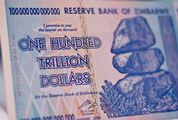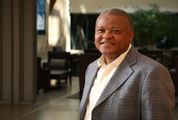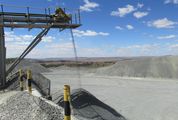BUSINESS DAY TV: Aspen’s acquisitions give it strong global positions in niche areas, says CEO
STEPHEN Saad is CEO of Aspen.
BUSINESS DAY TV: A 46% leap in revenue from its international business, thanks in part to the inclusion of recent acquisitions that helped drive an overall 22% rise in full year revenue and 15% growth in headline earnings for generics pharma group Aspen.
Its increasingly global reach also means more currency volatility for Aspen although a frenzy of M&A activity in the sector could throw up yet more opportunity for the group. Stephen Saad is Aspen Pharma Care’s CEO and joins us in the News Leader studio now.
Stephen...you’ve been described as a reverse rand hedge today by some commentators because there has been a lot of currency volatility and you’re now operating in a lot of jurisdictions, just how bad has dollar strength been for the group?
STEPHEN SAAD: So dollar...if you look at our overall group and you look at our mix of currencies our biggest basket of currencies is the euro, the rand and the Australian dollar. Then there’s a lot of Latin American currencies as well, mainly the reals, so we don’t have a lot of dollar sales, maybe R1bn... just short of R1bn in sales.
So if the dollar appreciates against all currencies globally it’s very negative for Aspen and it’s most negative when it appreciates against the euro. And it’s compounded even further when the rand over this period to June 2015 appreciates against all the currencies I mentioned, it appreciates against the Australian dollar, it even appreciated against the euro in that period.
If you look at where we are now of course the euro at least had continued to appreciate and move in tandem with the US dollar, well that’s a benefit for Aspen but if the euro depreciates from à1.40 to à1.08 or whatever it did in the last year, that’s not good for Aspen.
BDTV: Well there’s only so much you can control and currency volatility isn’t among those, so let’s take a look at what is in your control, and that your international business growth that you’re seeing, talk us through that and how much more of a skewing you’re anticipating in terms of international business as your revenue earner moving forward?
SS: When you look at the components of what we do in Aspen, we’ve got our South African business and business in sub-Saharan Africa, Asia-pacific and international. So if you look at our business outside of SA, it’s 77%, that’s why the rand is not a big issue in our lives as a group, but the international component of it is really a lot about Europe, the CIS and what we do in Latin America. And those regions have done particularly well, you know we put representation into Europe and into Russia now, we’ve got over 500 reps, across that region, and we’ve seen very good growth. Yes, it’s been acquisitive growth but if I just take brands that we’ve had for five years or three years, and look at them like for like, in euro terms, we were up 24%.
So just having that extra representation in markets that are very flat, like Europe has given, shown some growth, Latin America is doing fantastically well. Mexico is doing well, we’re doing well across particularly Spanish Latin America.
BDTV: So it’s a difficult global environment to be in, currency volatility as we mentioned but does it not deter Aspen and especially now with opportunities being thrown up by, as I said, this M&A frenzy that is taking place in the pharmaceutical sector?
SS: There’s a tremendous amount of opportunity in pharmaceuticals and there’s a tremendous amount to M&A and it is a frenzy, you’re quite right. From an Aspen perspective, what drives you...are you forced into inorganic growth and there’s two ways to look at the business, one is the organic opportunities within the group, can I control currencies, no we can’t. But can we manage our business so that we get less currency, yes we can.
So what are we doing organically, well we’ve done some big acquisitions but there are long lead times, regulatory lead times to make the necessary changes in Pharma and what we’re saying is that over the next three years, those synergies that we hope to extract out of those acquisitions will deliver at least R2.5bn.
In addition, the acquisitions made are so good and are giving us such globally strong positions in niche areas, heparin, biologicals, biochemical, in certain key areas that we actually feel that we’ve got an opportunity in the US market now for Aspen. And we’re doing this outside of currencies, it’s not a currency issue that we’re trying to...the fact that it helps is just a bonus but it’s because you cannot go and offer … Aspen offering in SA into the US market.
There’s already a lot of big players who do that in there. So we have to come in with something different and differentiated. And so we’ve got a niche range of products that we believe we’ll bring into the US market and it’s going to be certainly the next big frontier for Aspen to get into the US market.
BDTV: How soon are you targeting that kind of growth and expansion?
SS: So we started this some time back and we’ve got a registration process but as I say we’re doing just under R1bn of sales there in the US and we’ve got registrations come through now and we expect this to start coming up through even into this financial year of ours: June 2016.
So it will be a rollout from here. The inorganic opportunities are twofold for us...what people don’t realise is that if you look at everything we’ve divested, once we’ve received all our money we might get $700m or $800m depending upon what day, what currency you’re looking at and what time you want to convert Australian dollars into etcetera. And that’s all about driving focus in Aspen.
BDTV: So what is the focus, you talk about focusing on key therapeutic areas in the group, so what essentially, where do you really want to play as a pharmaceutical company?
SS: So in an ideal world we’ll take whatever opportunities there are because that’s the entrepreneurial nature within the business, but in an ideal world where would we like to grow. We’d like to grow off the strengths we have and where are those strengths? Those strengths are in the heparin-based products where we have global leadership in terms of supply of traceable porcine product. There’s the women’s health region … where we’re very strong, steroids, hormones, these are key areas of growth for Aspen and key therapeutic areas that we’d like to grow our businesses in.
BDTV: Where you talk about currency risk there’s also some constraint being brought to the business by supply, manufacturing supply and that came to bear in your Latin American business specifically, talk us through that and how you manage those relationships moving forward?
SS: In many instances we acquire these products and we acquire them from multinational products, the products in Latin America in particular and that multi-national facility is either closed or closed by the authorities and you have interruption in supply. What we try and do ideally is to shift out of those supply chains anyway as quickly as we can because operationally Aspen is very efficient and so not only do you get a better cost of goods but no one shows the same urgency of your own products you really make yourself, okay? Where it becomes a real problem for us is when you’re dependent because this whole regulatory timeline might take two or three years to change that supply...in that period if you’re let down by that supply. And that essentially is what happened to us in Latin America and is happening to us.
BDTV: Stephen, what about infant nutritionals, you’ve been in talks for a long time and now it looks as if those talks have not come to fruition? Is it still a business that you would like to get involved in and the failure to I suppose consummate anything through the talks that you’ve had so far is that a bit of a blot in your deal-making ability?
SS: It’s a credit and I’ll tell you why...well let’s just talk about infant milk formulas as category. Love infant milk formulas, Aspen loves infant milk formulas, it’s a very hard business to be in, brand conscious and incredibly tricky manufacturing process. So we love infant nutrition and we’re doing fantastically in SA. We’ve got our market share higher than we’ve ever had it before, we’ve done fantastically in Australia and we’re doing brilliantly in Latin America.
Our biggest market for infant milk formulas in the world is China and we were looking at growing Aspen into Asia and to China. Now yes we can do a deal at any price and do things etcetera, and yes, for a one-off spike, but that’s not how we’ve operated, been here for a long time, you should be proud of the fact that we can walk away from deals. Equally you don’t want to do bad deals and the reality of China is you can do very bad deals in China. There’s a bubble...forget about what you’re seeing in the markets. There’s a bubble in infant milk formula pricing because of the babies that were killed, but now there’s a switch to e-commerce, so people can go online and order from Australia, New Zealand, the prices have come down.
There’s a...you might own your business in China but you never control your business in China. The government wants to reduce the number of manufacturers. Best you make sure you’re not part of the reduction process.
So there’s a lot of factors one has to consider but we’re still excited by the Chinese market. There are a lot of babies born and they’re looked after but if we’re going to do it we must do the right deal.
STEPHEN Saad is CEO of Aspen.
BUSINESS DAY TV: A 46% leap in revenue from its international business, thanks in part to the inclusion of recent acquisitions that helped drive an overall 22% rise in full year revenue and 15% growth in headline earnings for generics pharma group Aspen.
Its increasingly global reach also means more currency volatility for Aspen although a frenzy of M&A activity in the sector could throw up yet more opportunity for the group. Stephen Saad is Aspen Pharma Care’s CEO and joins us in the News Leader studio now.
Stephen...you’ve been described as a reverse rand hedge today by some commentators because there has been a lot of currency volatility and you’re now operating in a lot of jurisdictions, just how bad has dollar strength been for the group?
STEPHEN SAAD: So dollar...if you look at our overall group and you look at our mix of currencies our biggest basket of currencies is the euro, the rand and the Australian dollar. Then there’s a lot of Latin American currencies as well, mainly the reals, so we don’t have a lot of dollar sales, maybe R1bn... just short of R1bn in sales.
So if the dollar appreciates against all currencies globally it’s very negative for Aspen and it’s most negative when it appreciates against the euro. And it’s compounded even further when the rand over this period to June 2015 appreciates against all the currencies I mentioned, it appreciates against the Australian dollar, it even appreciated against the euro in that period.
If you look at where we are now of course the euro at least had continued to appreciate and move in tandem with the US dollar, well that’s a benefit for Aspen but if the euro depreciates from à1.40 to à1.08 or whatever it did in the last year, that’s not good for Aspen.
BDTV: Well there’s only so much you can control and currency volatility isn’t among those, so let’s take a look at what is in your control, and that your international business growth that you’re seeing, talk us through that and how much more of a skewing you’re anticipating in terms of international business as your revenue earner moving forward?
SS: When you look at the components of what we do in Aspen, we’ve got our South African business and business in sub-Saharan Africa, Asia-pacific and international. So if you look at our business outside of SA, it’s 77%, that’s why the rand is not a big issue in our lives as a group, but the international component of it is really a lot about Europe, the CIS and what we do in Latin America. And those regions have done particularly well, you know we put representation into Europe and into Russia now, we’ve got over 500 reps, across that region, and we’ve seen very good growth. Yes, it’s been acquisitive growth but if I just take brands that we’ve had for five years or three years, and look at them like for like, in euro terms, we were up 24%.
So just having that extra representation in markets that are very flat, like Europe has given, shown some growth, Latin America is doing fantastically well. Mexico is doing well, we’re doing well across particularly Spanish Latin America.
BDTV: So it’s a difficult global environment to be in, currency volatility as we mentioned but does it not deter Aspen and especially now with opportunities being thrown up by, as I said, this M&A frenzy that is taking place in the pharmaceutical sector?
SS: There’s a tremendous amount of opportunity in pharmaceuticals and there’s a tremendous amount to M&A and it is a frenzy, you’re quite right. From an Aspen perspective, what drives you...are you forced into inorganic growth and there’s two ways to look at the business, one is the organic opportunities within the group, can I control currencies, no we can’t. But can we manage our business so that we get less currency, yes we can.
So what are we doing organically, well we’ve done some big acquisitions but there are long lead times, regulatory lead times to make the necessary changes in Pharma and what we’re saying is that over the next three years, those synergies that we hope to extract out of those acquisitions will deliver at least R2.5bn.
In addition, the acquisitions made are so good and are giving us such globally strong positions in niche areas, heparin, biologicals, biochemical, in certain key areas that we actually feel that we’ve got an opportunity in the US market now for Aspen. And we’re doing this outside of currencies, it’s not a currency issue that we’re trying to...the fact that it helps is just a bonus but it’s because you cannot go and offer … Aspen offering in SA into the US market.
There’s already a lot of big players who do that in there. So we have to come in with something different and differentiated. And so we’ve got a niche range of products that we believe we’ll bring into the US market and it’s going to be certainly the next big frontier for Aspen to get into the US market.
BDTV: How soon are you targeting that kind of growth and expansion?
SS: So we started this some time back and we’ve got a registration process but as I say we’re doing just under R1bn of sales there in the US and we’ve got registrations come through now and we expect this to start coming up through even into this financial year of ours: June 2016.
So it will be a rollout from here. The inorganic opportunities are twofold for us...what people don’t realise is that if you look at everything we’ve divested, once we’ve received all our money we might get $700m or $800m depending upon what day, what currency you’re looking at and what time you want to convert Australian dollars into etcetera. And that’s all about driving focus in Aspen.
BDTV: So what is the focus, you talk about focusing on key therapeutic areas in the group, so what essentially, where do you really want to play as a pharmaceutical company?
SS: So in an ideal world we’ll take whatever opportunities there are because that’s the entrepreneurial nature within the business, but in an ideal world where would we like to grow. We’d like to grow off the strengths we have and where are those strengths? Those strengths are in the heparin-based products where we have global leadership in terms of supply of traceable porcine product. There’s the women’s health region … where we’re very strong, steroids, hormones, these are key areas of growth for Aspen and key therapeutic areas that we’d like to grow our businesses in.
BDTV: Where you talk about currency risk there’s also some constraint being brought to the business by supply, manufacturing supply and that came to bear in your Latin American business specifically, talk us through that and how you manage those relationships moving forward?
SS: In many instances we acquire these products and we acquire them from multinational products, the products in Latin America in particular and that multi-national facility is either closed or closed by the authorities and you have interruption in supply. What we try and do ideally is to shift out of those supply chains anyway as quickly as we can because operationally Aspen is very efficient and so not only do you get a better cost of goods but no one shows the same urgency of your own products you really make yourself, okay? Where it becomes a real problem for us is when you’re dependent because this whole regulatory timeline might take two or three years to change that supply...in that period if you’re let down by that supply. And that essentially is what happened to us in Latin America and is happening to us.
BDTV: Stephen, what about infant nutritionals, you’ve been in talks for a long time and now it looks as if those talks have not come to fruition? Is it still a business that you would like to get involved in and the failure to I suppose consummate anything through the talks that you’ve had so far is that a bit of a blot in your deal-making ability?
SS: It’s a credit and I’ll tell you why...well let’s just talk about infant milk formulas as category. Love infant milk formulas, Aspen loves infant milk formulas, it’s a very hard business to be in, brand conscious and incredibly tricky manufacturing process. So we love infant nutrition and we’re doing fantastically in SA. We’ve got our market share higher than we’ve ever had it before, we’ve done fantastically in Australia and we’re doing brilliantly in Latin America.
Our biggest market for infant milk formulas in the world is China and we were looking at growing Aspen into Asia and to China. Now yes we can do a deal at any price and do things etcetera, and yes, for a one-off spike, but that’s not how we’ve operated, been here for a long time, you should be proud of the fact that we can walk away from deals. Equally you don’t want to do bad deals and the reality of China is you can do very bad deals in China. There’s a bubble...forget about what you’re seeing in the markets. There’s a bubble in infant milk formula pricing because of the babies that were killed, but now there’s a switch to e-commerce, so people can go online and order from Australia, New Zealand, the prices have come down.
There’s a...you might own your business in China but you never control your business in China. The government wants to reduce the number of manufacturers. Best you make sure you’re not part of the reduction process.
So there’s a lot of factors one has to consider but we’re still excited by the Chinese market. There are a lot of babies born and they’re looked after but if we’re going to do it we must do the right deal.




















Login OR Join up TO COMMENT